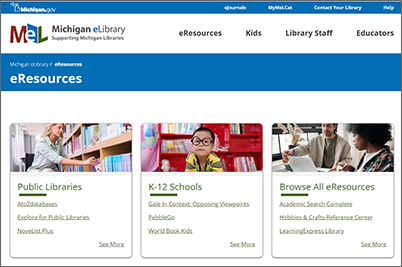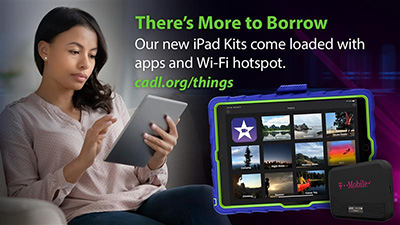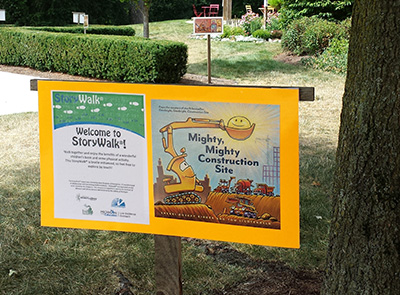Library of Michigan
702 West Kalamazoo Street
P.O. Box 30007
Lansing, MI 48909-7507
United States
The Grants to States Program
The Grants to States Program is the largest grant program run by IMLS; it provides funds to State Library Administrative Agencies (SLAAs) using a population-based formula set by the law. SLAAs determine goals and objectives for the funds in their statutorily required five-year plan (see below). For more information, see the Grants to States program overview.
- Annual Allotments20204597286.0020214603447.0020224608111.0020234831975.0020244788124.00
- 5 Year Plan Text
Each state creates a 5-year plan for its programs to strengthen the efficiency, reach, and effectiveness of library services. View all states' plans.
5 year planAttachment Size michigan5yearplan.pdf 294.05 KB
- 5 Year Evaluation Text
At the end of a 5-year period, each state reports their results in achieving goals and objectives projected in their 5-Year Plan. View all states' evaluations.
5 year evaluationAttachment Size michigan5yearevaluation.pdf 611.05 KB

“Libraries have become community anchors, providing Internet access, literacy support, educational programming and content in traditional print and digital formats for everyone. We provide MeL, MeLCat and a range of training opportunities and resources to support our libraries as they strive to meet their community needs."
-- Randy Riley, State Librarian, Library of Michigan
Project Examples

Michigan eLibrary
The Michigan eLibrary (MeL) is the state’s digital library, whose project encompasses access, website development, and training and support for public, school, and academic libraries. MeL contains e-resources that cover a wide range of topics to meet the needs of different library patrons, including general interest, such as auto repair and genealogy, PreK-12 and academic educational materials, allied health, business, reference eBooks, GED test preparation, college entrance exams, licensing and certification tests, career preparation, and workforce skills building. MeL’s resources are available to all Michigan residents at no direct cost to them wherever they have internet access. MeL staff also work with Michigan’s libraries to help them effectively use the e-resources and convey their importance to patrons.
IMLS Funds: $1,871,578.86

Improving Access to Information
As part of the Library of Michigan’s competitive grant program, the Capital Area District Library (CADL) offered a digital inclusion project focused on iPad kit lending. CADL purchased and circulated kits to patrons that included an iPad with pre-installed educational and productivity apps along with a hotspot to provide internet access. These kits were especially important during the pandemic because they helped address the lack of internet access and helped patrons increase their digital confidence. They circulated over 200 times in eight months and helped address a real need in the community.
IMLS Funds: $24,509.40

Early Literacy Support for Libraries and Communities
The Library of Michigan's Ready to Read Michigan (RTRM) program provides statewide early literacy support for public libraries. It is designed to help public library staff model early literacy skill development directly to families and caregivers with young children aged birth to 5. Through the program, public libraries engage in outreach to families and caregivers, as well as early childhood centers, schools, and daycares in their community. RTRM offered trainings by early literacy consultants and storytellers, and provided resources, such as toolkits and professionally designed materials to support programming, including a few translated into Arabic and Spanish.
IMLS Funds: $6,469.26
Review recent Grants to States projects from this state library in the State Program Report database.
Search the Awarded Grants Database for additional details about awards in this state
Five-Year Plan Highlights
Goal 1: Michigan libraries will have access to collection resources in support of their community’s information needs.
- Projects include:
- MeLCat, the statewide resource sharing system for library collections
- MeL, the statewide digital library
Goal 2: Michigan libraries will have access to staff training and resources on library programming and services in support of their community’s lifelong learning needs.
- Projects include:
- Professional development resources and training for library staff, trustees, and board members
Goal 3: Michigan libraries will have access to staff training and resources on various literacies in support of their community’s range of literacy needs.
- Projects include:
- Summer reading support for libraries
- Family and early literacy skills
- Vocational, workforce development, and educational testing skills
- Support for other literacies and demographic groups
- Grants to improve community access to information related to literacies
Goal 4: Michigan libraries will have opportunities to increase digital inclusion in support of their community’s need for digital equity.
- Projects include:
- Support for libraries from small communities to have a library website
- Support and training for the E-rate program and other broadband initiatives
- Grants for technology
- Grants related to digital inclusion
Goal 5: Michigan libraries will have opportunities to improve their local history and special collections in support of their community’s history.
- Projects include:
- Statewide digitization support
- Training for local history and special collections
- Grants for preservation/digitization of local history and special collections
IMLS Data Collection
State Library Administrative Agency Survey
The State Library Administrative Agency Survey (SLAA) provides descriptive data about state library agencies for all fifty states and the District of Columbia. To interact with the latest data, please visit the
SLAA Survey Comparison Tool.
Public Libraries Survey
The Public Libraries Survey (PLS) provides national descriptive data on the status of public libraries in the United States and its territories. Explore state profiles representing more than 9,000 public library systems and over 17,000 public library outlets.

